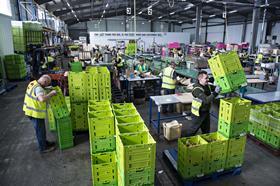
The Butters Group has announced plans to extend the number and variety of UK-grown flowers it supplies.
The Spalding-based company'sButters Flowers division, which boasts a £12 million turnover, is currently working with a grower in Boston to produce locally-grown tanacetum parthenium (a variety of chrysanthemum) to use in bouquets for Waitrose – a bloom which is normally imported from Holland.
And next year, it hopes to increase trials to extend the UK growing season for agapanthus so that British flowers can be used for a longer period of the year rather than relying on imports from Colombia or Kenya.
Both projects are being spearheaded by Butters' technical manager Tracey Thomas, who has also been running trials for the Cut Flower Centre to help product development.
Jo Pearson, the group’s business development manager, said: “At Butters we are passionate about getting more products from UK sources on the shelves. Anything we can do to advance the UK growing sector we will. We want to work with growers to create new and alternative products and improve the quality.
“The support from Waitrose has been instrumental in helping us to do that. They are committed to selling UK flowers and that has helped enormously.”
Butters Flowers, which packages and distributes nearly 3,500 bouquets a day from its centre in Lincolnshire, is hopeful that commitment to British blooms can extend to other customers.
The products it distributes on behalf of Interflora, Flying Flowers and Moon Pig still top many competitors for the amount of UK sourced flowers, topping 20 per cent on average, but the company accepts there is room for improvement.
However it may be consumers, rather than suppliers, who hold the key.
To win that battle, the current campaign to encourage people to buy British – with the inclusion of the Union Jack on the labels of UK grown flowers – has made some gains.
Pearson believes the campaign needs to increase its bombardment on the public consciousness to have a better chance of victory, andpoints to the positive work done within the UK food industry to raise the profile of individual suppliers, farmers and producers as an example of what can be achieved. Interflora and Waitrose have already made strides in this direction, she noted, but more can be done by the industry as a whole.
“The concept of the Union Jack labelling is right but the execution needs to be stronger. The more we can do to promote the flag the better. We want to be waving it as proudly and as visibly as possible,” Pearson added.



